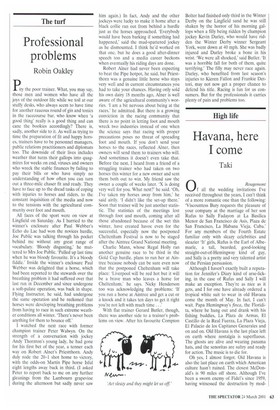The turf
Professional problems
Robin Oakley
Pity the poor trainer. What, you may say, those men and women who have all the joys of the outdoor life while we toil at our stuffy desks, who always seem to have time for another raucous round of gin and tonics in the racecourse bar, who know when 'a good thing' really is a good thing and can cane the bookies accordingly? There is, sadly, another side to it. As well as trying to time the preparation of fit and happy horses, trainers have to be personnel managers, public relations practitioners and diplomats too. The downside of their lives includes weather that turns their gallops into quagmires for weeks on end, viruses and owners who wreck the stable finances by failing to pay their bills or who have simply no understanding of how often you can turn Out a three-mile chaser fit and ready. They have to face up to the dread tasks of coping with injuries to horses and riders, to the constant inquisition of the media and now to the tensions with the agricultural community over foot and mouth.
All faces of the sport were on view at Lingfield on Saturday. As I hurried to the winner's enclosure after Paul Webber's Echo du Lac had won the novices hurdle, Joe Public was talking through his pocket behind me without any great range of vocabulary. 'Bloody disgusting,' he muttered to Mrs Joe Public. 'Pulled up last time when he was bloody favourite. It's a bloody fiddle.' Inside the winner's enclosure Paul Webber was delighted that a horse, which had been reported to the stewards over the breathing problem it had suffered over that last run in December and since undergone a soft-palate operation, was back in shape. Flying Instructor, he said, had undergone the same operation and he reckoned that horses were developing breathing problems from having to race in such extreme weather conditions all winter. 'There's never been anything for them to bounce off.'
I watched the next race with former champion trainer Peter Walwyn. On the strength of a conversation with jockey Andy Thornton's young lady, he had gone for his first bet of the year, a tenner each way on Robert Alner's Priestthorn. Andy duly rode the 20-1 shot home to victory, with the odds-on Martin Pipe horse Isful eight lengths away back in third. (I asked Peter to report back to me on any further gleanings from the Lambourn grapevine during the afternoon but sadly never saw him again.) In fact, Andy and the other jockeys were lucky to make it home after a black collie ran out from behind a hurdle just as the horses approached. `Everybody would have been barking if something had happened,' said the mud-spattered jockey as he dismounted. I think he'd worked on that one, but he does a good after-dinner speech too and a media career beckons when eventually his riding days are done.
Robert Alner had never been expecting to beat the Pipe hotpot, he said, but Priestthorn was a genuine little horse who stays very well and in current circumstances you had to take your chances. Having only sold his own dairy 18 months ago, Alner is well aware of the agricultural community's worries, 'I am a bit nervous about being at the races,' he admitted. But there is a growing conviction in the racing community that there is no point in letting foot and mouth wreck two industries instead of one when the science says that racing with proper precautions poses no threat of spreading foot and mouth. If you don't send your horses to the races, reflected Alner, then owners will send them to trainers who will. And sometimes it doesn't even take that. Before the next, I heard from a friend of a struggling trainer who had taken on two horses this winter for a new owner and sent them both out to win. My friend saw the owner a couple of weeks later. 'X is doing very well for you. What next?' he said. 'Oh, , I've taken my horses away from him,' he said airily. 'I didn't like the set-up there.' Soon that trainer will be just another statistic. The statistics of the meetings lost through foot and mouth, coming after all those abandoned because of the wet this winter, have created havoc even for the successful, especially now the postponed Cheltenham Festival is now to be staged after the Aintree Grand National meeting.
Charlie Mann, whose Regal Holly ran another genuine race to be third in the Gold Cup hurdle, plans to run her at Aintree because nobody can be sure even now that the postponed Cheltenham will take place: 'Liverpool will be red hot but it will be a brave man who leaves a horse for Cheltenham,' he says. Nicky Henderson too was acknowledging the problems: 'If you run a horse at Aintree and get a cut or a knock and it takes ten days to get it right you're not left with much time ..
With flat trainer Gerard Butler, though, there was another side to a trainer's problems on view. After his favourite Compton
Bolter had finished only third in the Winter Derby on the Lingfield sand he was still shaken by the horror of his morning gallops when a filly being ridden by champion jockey Kevin Darley, who would have ridden the Winter Derby winner Sergeant York, went down at 40 mph. She was badly injured and Darley broke a bone in his wrist. 'We were all shocked,' said Butler. 'It was a horrible fall for both of them, quite terrifying.' The filly may never race again. Darley, who benefited from last season's injuries to Kieren Fallon and Frankie Dettori, may not now get a proper chance to defend his title. Racing is fun for us consumers. But for the professionals it carries plenty of pain and problems too.














































































 Previous page
Previous page